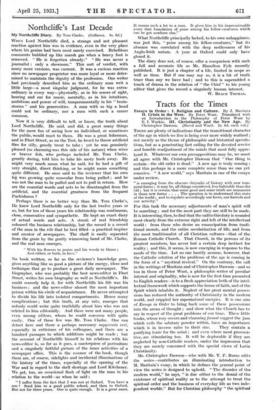Notthcliffe's Last Decade
My Northcliffe Diary. By Tom Clarke. (Gollancz. 8s. 6d.) WHEN Lord Northcliffe died, a strange and not pleasant reaction against him was in evidence, even in the very place where his genius had been most surely exercised. Rebellious comments bubbled up like marsh gas when a heavy foot is removed. " He is forgotten already." " He was never a journalist : only a showman." This sort of verdict, with many more versions, was current. It was a curious reaction since no newspaper proprietor was more loyal or more deter- mined to maintain the dignity of the profession. One writer had previously described him as the ordinary man writ a little large—a most singular judgment, for he was extra- ordinary in every way—physically, as in his senses of sight, hearing and ear for music, mentally, as in his intuitions, ambitions and power of will, temperamentally in his " brain- storms " and his generosities. A man with so big a head could not be ordinary, nor a man with such a career common.
Now it is very difficult to tell, or know, the truth about Lord Northcliffe. He said, and did, a great many things for the mere fun of seeing how an individual, or sometimes the public, would react to them. He was a great fisherman, and in Fleet-Street, as on the Test, he loved to throw artificial flies for silly,- greedy trout to take ; yet he was genuinely
pleased (so charming was this side of his nature) when wiser or braver fish, who perhaps included Mr. Tom Clarke,
greatly daring, told him to take his nasty hook away. He might very much mean what he said, for- he had a gift of very straight, direct thinking, or he might mean something quite different. He once said to the reviewer that his own leg was growing quite muscular from being pulled ; and he was not the man to be pulled and not to pull in return. How are the essential words and acts to be disentangled from the
artificial, and the essential greatness from the frequent Puekishness ?
Perhaps there is no better way than Mr. Torn Clarke's, He knew Lord Northcliffe only for the last twelve years or so, but for ten of those years his relationship was continuous, close, consecutive and sympathetic. He kept an exact diary of actual words and acts. A streak of real friendship coloured the business relationship, but the record is a record of the man in the role that he best filled—a practical inspirer and creator of newspapers. The chaff is easily separated from the grain by the gently winnowing hand of Mr. Clarke, and the real man emerges,
" With his flowers to praise and his weeds to blame ; And either, or both, to love."
No book written, so far as the reviewer's knowledge goes, gives anything like so good a picture of the energy, ideas and technique that go to produce a great daily newspaper. The biographer, who was probably the best news-editor in Fleet Street, writes his own biography as well as Northcliffe's. He could scarcely help it, for with Northcliffe his life was his business ; and the news-editor almost the most important peison within his circle of acquaintance. He never attempted to divide his life into isolated compartments. Hence many complications ; but this truth, at any rate, emerges that nobody could write quite truthfully about him who was not 'related to him editorially. And there were not many people, even among editors, whom he could converse with quite easily. One of these few was .Mr. Tom Clarke. One can detect here and there a perhaps necessary suppressio veri, especially in criticisms of his colleagues, and there arc a hundred passages to which additions might be made ; but the account of Northcliffe himself in his relations with his news-editor is, so far as it goes, a masterpiece of portraiture and a singularly faithful picture of the inner activities of a newspaper office. This is the essence of the book, though there are, of course, sidelights and incidental illuminations of the history of the times, especially at the opening of the War and in regard to the shell shortage and Lord Kitchener. We get, too, an occasional flash of light on the man in his relation to the world—as when he said : " I suffer from the fact that I was not at Oxford. You have a son ? Send him to a good public school, and then to Oxford. But not for three years. One is quite enough. It is a great asset. It means such a lot to a man. It gives him in his impressionable years that foundation of poise among his fellow-creatures which can be got nowhere else."
What Northcliffe principally lacked, to his own unhappiness, was just this, " poise among his fellow-creatures," but its absence was correlated with the deep restlessness of his Anglo-Irish nature. A year at Oxford could only have glozed it.
The diary does not, of course, offer a comparison with such a full and accurate life as Mr. Hamilton Fyfe recently published. It is just a chapter of a life, limited in scope as well as time. But if one may say so, it is a bit of truth truer than any we have had ; and to this is superadded a touch of drama in the relation of " the Chief " to his young editor that gives the record a singularly human interest.
W. BEACH THOMAS.






































 Previous page
Previous page